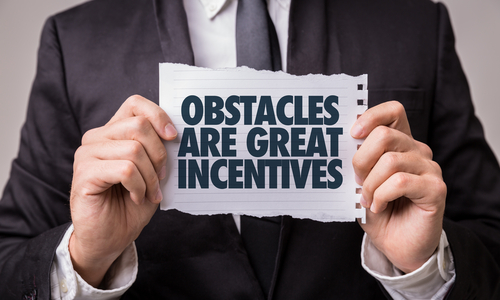Facebook COO Sheryl Sandberg and Wharton professor Adam Grant have recently released a new book on resilience. Sandberg lost her husband suddenly in 2015. As she struggled to adjust to life without her mate she became interested in resiliency and how she could demonstrate this quality in response to her own personal tragedy. As I came across her story I reflected on the relationship between adversity, resilience and success, and how these concepts intertwine in the pursuit of excellence.
Expect and embrace adversity. The first step in becoming resilient is to expect adversity. Most of us do not relish difficult situations. When was the last time you told yourself how much you were looking forward to difficulty in your life or career? We often expect things to go smoothly and get irritated and annoyed when they don’t. If you understand that nothing truly worthwhile is accomplished without difficulty, you’ll use adversity as motivational fuel. Adversity is a sign that what you are doing truly matters. So rather than being thrown off course when you encounter adversity, expect it along the journey to success.
True success is not achieved without failure. If you have identified a truly meaningful goal, at times you will fall short along the way to achieving it. The path to success is not linear. When a client of mine suffers a significant setback in their career, we immediately conduct a “lessons learned” exercise. We identify the factors resulting in the failure and determine if another course of action would be more effective in the future. Notice that I said when a client suffers a setback rather than if. The only way to avoid significant setbacks is to put yourself in situations that do not challenge the highest level of your ability. In other words, if you are playing below your talent level you will not likely fail. But you will also never truly realize your full potential.
Build a learning team. Okay, now we’ve established that everyone will encounter adversity and failure is inevitable if we’re trying to accomplish something truly important. But failure doesn’t feel good, and if you fail too often you may not be given the opportunity to succeed. So we must develop an attitude and culture around failure that allows us to learn from it and avoid similar setbacks in the future. Strong leaders create a learning environment that allows people to challenge themselves and grow. If the response to failure is anger and blame, it’s natural to retreat instead of learning. We don’t have to like failure, but we do have to learn from it. Learning cannot occur in an environment where people feel they will be taken to the woodshed if they make a mistake. Instead, create a development culture.
Think like a scientist. In order to become resilient, you have to view your performance in a bit of a detached manner. Your performance is nothing more than data. If your performance is strong, identify the factors that contributed to your success and make a note to leverage them in the future. If not, identify what you need to change in order to improve, and make a commitment to doing so. But do not give your performance the power to control your emotions, particularly about yourself. The single biggest reason people don’t develop resilience is that they personalize their performance. Rather than examining their performance as information, they give it the power to control their self-worth and self-esteem. They might think, “If my performance was not up to par on this task, I must not be good enough.” This results in a toxic cycle where your view of yourself as a person is dependent on your performance. If you are challenging yourself to achieve something of great value, there is no room in the equation to take things personally.
Maintain balance. Resiliency requires emotional and physical resources. We build these resources by ensuring we stay in balance through proper rest, exercise, diet, and healthy relationships. If we are out of balance in any of these areas we will not have the energy to sustain resiliency. Of course, there will be times that you will be taxed beyond a healthy balance in one or more of these areas. But these taxing times have to be the exception rather than the rule. Don’t underestimate the importance of social support and healthy relationships in your balance equation. Nothing of any consequence is accomplished without the help and support of others. It’s very easy to become single-minded in pursuit of a highly motivational goal. But if you neglect any of these balance areas, you will run out of physical and emotional resources to maintain the resilience and excellence you have achieved.
Being resilient in the face of adversity is a key component of great leadership. Embrace the adversity you will inevitably experience. Understand that you will fail at times. When this occurs ensure you use failure as a learning opportunity. Don’t give your performance the power to control your identity. Take care of yourself and your relationships. Follow this formula and you’ll see that there is nothing you can’t handle!